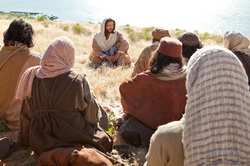
Webster’s dictionary has this to say about sin:
sin
noun
1. transgression of divine law: the sin of Adam.
2. any act regarded as such a transgression, especially a willful or deliberate violation of some religious or moral principle.
3.any reprehensible or regrettable action, behavior, lapse, etc.; great fault or offense: It's a sin to waste time.
I find it interesting that SIN is described as a noun when all the examples of sin are actions and therefore verbs. I do not think is a mistake; as you may remember when you first learned to read, a noun is a person, place, or thing. In this case I would consider sin all three. You might ask, “Walter, how can sin be all three?” or “How can you possibly come to this conclusion?” Well let’s break it down.
1. Is Sin a Person?
All transgressions against God come from one source, and that source is our advisory. And that advisory is of course Satan, or Lucifer is you prefer. An angel of God, indeed the head angel in charge of worship; Satan embodied the first sin pride and fought against God in effort to take heaven and God’s throne for himself and he got whooped. As Satan fell he took all of those with him he had corrupted, a full third of the heavenly hosts. Along with Satan they too became sin. If you have your Bible handy, please to turn to the book of Genesis chapter 4 verse 7.
“But if you do not do what is right, sin is crouching at your door; it desires to have you, but you must rule over it.”
If you take this verse into context of the chapter, God is warning Cain that the path he is taking is leading him to allow sin to have a hold of his life. When we commit trespasses against God, and indeed even when we think about trespassing against God, we are listening to our great advisory and his fallen angels. Giving the very personhood of sin influence over our lives.
2. Is Sin a Place?
Ok, so we have discussed how sin can be considered a person but how can sin also be a place? When we give the enemy Satan, our old advisory a foothold into our lives, we separate ourselves from God. God has given us free will so He will allow us to rest in sin if we chose to.
To paraphrase Albert Einstein, “Cold does not exist for cold is only the absence of heat. Much the same evil and therefore sin are the absence of God” When we enter into sin, we place ourselves into a state removed from the closeness of God. Outside of His warmth and light, away from the relationship He would have with us. Sin does not live in His divine Kingdom, so in order for us to be in sin we must enter into the enemy’s kingdom, a spiritual place apart from God. One day, when the Lord returns some of us; hopefully no one in this room, will enter into the enemy’s kingdom forever. Those that have not excepted Jesus Christ as their Lord and Savoir will enter into sheol, hades, hell; eternal separation from God. And we will pray for them.
3. Is Sin a Thing?
So if sin can be a person and a place, what about a thing? I would say sin is very much a thing. Let’s take a look at the book of Romans 8:3 and 8:5, Paul says this:
For what the law could not do in that it was weak through the flesh, God did by sending His own Son in the likeness of sinful flesh, on account of sin: He condemned sin in the flesh. (Romans 8:3)
This is confirming sin can be in the flesh, sin can be contained in flesh. This is a very important concept, especially considering what Paul goes on to say in Romans 8:5:
For those who live according to the flesh set their minds on things of the flesh, but those who live according to the Spirit, the things of the Spirit. (Romans 8:5)
If you live according to the flesh (sin) you will fill your life with fleshly (sinful) things, whereas if you live your life according to the Spirit (Big S) you will crave things in your life that are of the Holy Spirit.
So, sin can be understood as a person through Satan and his evil minions. Sin can be understood as a place, a separation from God. Sin can also be considered a thing that can lure us away from Godly things, and bring us out of the Kingdom of God and into a sinful place ruled by the personification of sin himself. Sin breeds sin.
But that’s not all.
Recently I have been informed that there has been a new definition added for nouns. Nouns do not only mean a person, place, or thing anymore. Now, nouns can also be ideas; sin, can be an idea. The funny thing is this is not new, new to us but not new to God. In the Sermon on the Mount, Jesus spoke before the multitudes:
“You have heard that it was said ‘You shall not commit adultery’. But I say to you, whoever looks at a woman to lust for her has already committed adultery with her in his heart.” (Matthew 5:27-28)
Even having the idea of sin is as bad as performing the sin because it has already infected your heart. This means you can have an idea that infects your flesh with sin which separates you from God putting you in a place outside of God’s Kingdom and into the very palm of the enemy. So what can we do?
Well thank God because He has the answer. 2000 years ago God sent His Son to pay the penalty of our sin. We can now rest in the arms of our loving God because Jesus suffered and died for us.
That being said, let us pray to our Saviour:
Dear Lord,
We could never put a price on what you did for us. If we could we wouldn’t have needed you to die for us. You have bought and paid for our very lives and we love you for it. Now we can enjoy a renewed and refreshed relationship with You because You tore the veil that separated us from the Father. Bless us and live with us today as we go out to live Christ-centered lives for Your honour and glory. In Your righteous name Lord, Amen.

 RSS Feed
RSS Feed